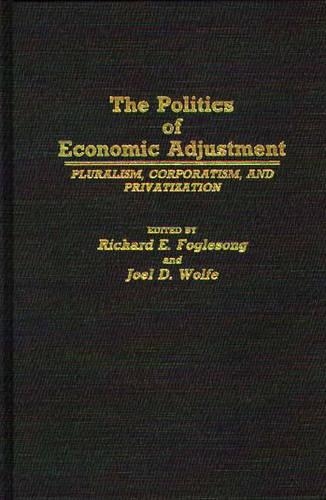
The Politics of Economic Adjustment: Pluralism, Corporatism, and Privatization
(Hardback)
Publishing Details
The Politics of Economic Adjustment: Pluralism, Corporatism, and Privatization
By (Author) Richard E. Foglesong
By (author) Joel Wolfe
Bloomsbury Publishing PLC
Praeger Publishers Inc
11th October 1989
United States
Classifications
Tertiary Education
Non Fiction
Central / national / federal government policies
338.94
Physical Properties
Hardback
198
Description
Privatization and corporatism along with pluralist forms of adaptation have received attention as strategies for coping with the transformation of mature industrial economies. This book is an account of the determinants of a government's choice between such strategies or of the relationships between these strategies and the Keynesian economic framework that predominated in the postwar era. This study considers both the determinants of the choice of an adjustment strategy, and how that choice affects the nature of liberal democracy. The essays collected here examine the divergent responses of liberal capitalist nations to the problem of economic adjustments, giving attention to the political factors affecting strategic choices aimed at bolstering employment, enhancing international competitiveness and restoring healthy productivity rates. The contributors examine the experiences of the United States, Britain, France, West Germany and Italy. They aim to explain how these advanced industrial nations have faced economic crisis differently and why they have responded as they have. In each case, the author focuses on whether and at what level the state pursued a corporatist approach involving a more direct government role in managing the economy with the assistance of private interest groups, a privatization strategy involving less state intervention and an increased reliance on market processes, or a form of pluralist adaptation. Throughout, the contributors aim to demonstrate that the strategy pursued can have a fundamental impact on the character of democracy and the patterns of policy making.
Reviews
Eight papers examine the divergent responses of liberal capitalist nations to the problem of economic decline. Papers discuss a political analysis of privatization in Britain; the politics of industrial policy in the United States; the industrial policy controversy in West Germany; neoliberalism and the battle over working-time reduction in West Germany; the international system and policy change in France; industrial adjustment in the French steel industry; deindustrialization, economic performance, and industrial policy--British and American theories applied to Italy; and a comparative analysis of political change...-Journal of Economic Literature
Nine selections, building on the literature on privatization and corporatism, focus on 'both the determinants of choice of an adjustment strategy and how that choice affects the nature of liberal democracy' in the face of economic decline and increasing international economic interdependence. Case studies of the United States, Great Britain, France, West Germany, and Italy are examined to explain their choice of industrial policy, taking into account differences in the setting and problems these economies face. Concludes with a section characterizing possible forms of democracy and relating these to adjustment strategies, enumerating 'the diverse ways in which capitalism and liberal democracy can be combines.'-Economic Books
"Eight papers examine the divergent responses of liberal capitalist nations to the problem of economic decline. Papers discuss a political analysis of privatization in Britain; the politics of industrial policy in the United States; the industrial policy controversy in West Germany; neoliberalism and the battle over working-time reduction in West Germany; the international system and policy change in France; industrial adjustment in the French steel industry; deindustrialization, economic performance, and industrial policy--British and American theories applied to Italy; and a comparative analysis of political change..."-Journal of Economic Literature
"Nine selections, building on the literature on privatization and corporatism, focus on 'both the determinants of choice of an adjustment strategy and how that choice affects the nature of liberal democracy' in the face of economic decline and increasing international economic interdependence. Case studies of the United States, Great Britain, France, West Germany, and Italy are examined to explain their choice of industrial policy, taking into account differences in the setting and problems these economies face. Concludes with a section characterizing possible forms of democracy and relating these to adjustment strategies, enumerating 'the diverse ways in which capitalism and liberal democracy can be combines.'"-Economic Books
Author Bio
RICHARD E. FOGLESONG is Associate Professor of Politics at Rollins College in Florida. He wrote Planning the Capitalist City and articles published in Challenge and the Orlando Sentinel. In 1990, Foglesong will be the Harvey S. Perloff Visiting Professor of Urban Planning in the Graduate School of Architecture and Urban Planning at UCLA. JOEL D. WOLFE is Associate Professor of Political Science at the University of Cincinnati. He wrote Workers, Participation, and Democracy (Greenwood Press, 1985) and numerous articles published in the Political Science Reviewer, West European Politics, The Review of Politics, Comparative Politics, and Polity.
